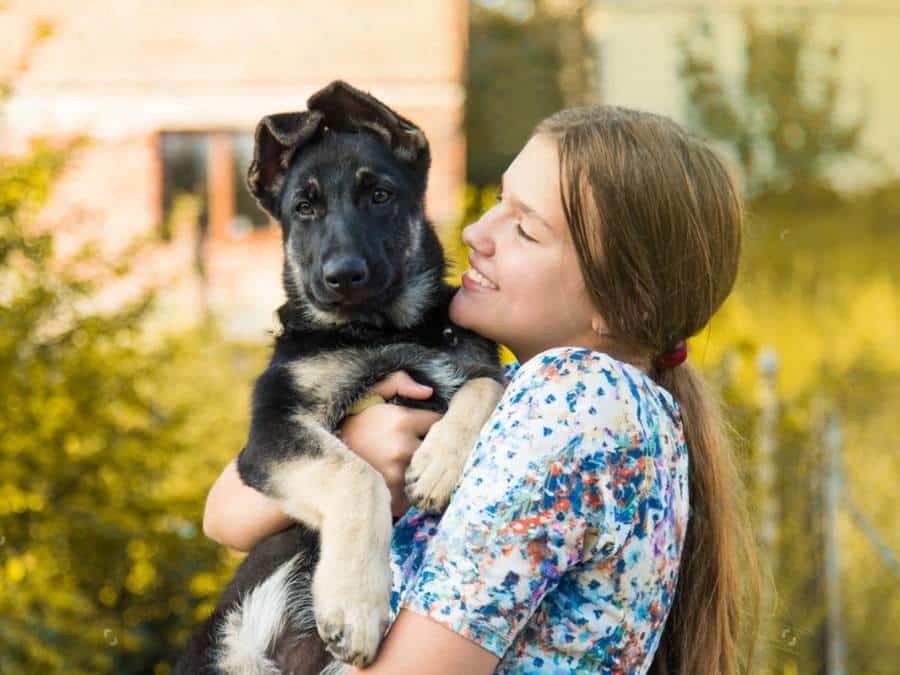Thinking about adopting a German Shepherd? Excellent choice! I have had 3 of my own.
These loyal and intelligent dogs make for devoted companions, but they also require commitment.
Adopting a German Shepherd means embracing an active lifestyle while providing consistent training and socialization. This breed thrives on human interaction but also needs space to roam freely.
So before deciding to bring one home, it’s essential to understand the responsibilities that come with owning one of these fabulous dogs.
What To Know Before Adopting a German Shepherd
German Shepherds are intelligent and versatile dogs, but like any breed, they have specific characteristics and needs.
Here are 10 important things to know about German Shepherds before bringing one home:
1. German Shepherds are medium-large dogs.
German Shepherds are large dogs and their size is an important factor to consider when deciding if they are suitable for your lifestyle.
Adult males typically stand between 24 to 26 inches tall, while females are slightly smaller, ranging from 22 to 24 inches. These dogs can weigh anywhere between 60-90 pounds.
Due to their size and energy levels, German Shepherds are better suited for homes with ample space, such as houses with secure yards.
They thrive in environments where they have room to move around, and having a secure yard can provide them with the freedom to exercise and play safely.
Ask yourself – Do I have enough space in my home and a secure outdoor area for an adult German Shepherd to run around comfortably?
If you have the space and ability to handle and care for a large and active dog, German Shepherds can be wonderful and loyal companions.
RELATED: Are German Shepherds Good Family Dogs?

2. GSDs need 1-2 hours of daily exercise.
German Shepherds are active, athletic dogs that require regular and vigorous exercise to maintain their physical health and mental well-being.
Daily exercise is essential to prevent boredom and behavioral issues. A minimum of 60 minutes of brisk walking, jogging, or playtime is recommended, but many German Shepherds thrive with even more activity.
These dogs enjoy outdoor activities, and their exercise routine should include activities like hiking, running, agility training, and playing fetch.
This is why GSDs are well-suited for individuals or families with an active lifestyle.
Ask yourself: Do I have enough time for daily walks, playtime, and training sessions with my dog?
If you enjoy outdoor activities, and exercise, and are willing to invest time in training and mental stimulation, a German Shepherd can be a great fit.
RELATED: How Much Exercise Does a German Shepherd Need?
3. German Shepherds are heavy shedders.
German Shepherds shed year-round, with heavier shedding occurring during seasonal changes, particularly in the spring and fall.
To manage their shedding and maintain a healthy coat, German Shepherds require consistent grooming. Brushing at least a few times a week is recommended, and daily brushing may be necessary during peak shedding seasons.
German Shepherds do not require frequent baths unless they get exceptionally dirty. Regular ear cleaning, teeth brushing, and nail trimming should also be part of the grooming routine.
Ask yourself: Am I prepared to handle grooming and cleaning tasks to manage their shedding?
If you or a family member has allergies or dislike the idea of regular brushing and managing shedding, a German Shepherd may not be the best fit for you.
RELATED: 10 Reasons To Adopt A German Shepherd
4. They need a strong leader.
German Shepherds have a strong pack mentality, and they naturally look for a leader within their family or human group.
In the absence of a clear leader, they may attempt to assume the role themselves, which can lead to territorial behavior, overprotectiveness, or even aggression.
Establishing yourself as the pack leader is crucial for the well-being of a German Shepherd. Consistent and positive training from an early age helps set boundaries and reinforces your position as a leader.
Ask yourself: Can I be a strong leader & provide directions to my dog?
If you are a confident and assertive individual who can provide clear leadership through positive reinforcement and consistent training, a German Shepherd can be a highly suitable companion.
RELATED: Male vs Female German Shepherd: Which is Better?

5. German Shepherds have strong guarding instincts.
German Shepherds have an innate protective instinct that makes them naturally vigilant and alert. They are known for their loyalty to their families and may act as effective watchdogs.
While their guarding instincts are valuable, uncontrolled guarding instincts can lead to overprotectiveness, which may manifest as excessive barking, lunging, or even aggression.
Proper training and socialization from a young age are crucial to mitigate these challenges.
Ask yourself: Am I prepared to invest time in obedience training and exposing my dog to various environments and people so that they grow up to be well-adjusted adult dogs?
German Shepherds can be suitable for individuals or families seeking a protective and loyal companion. However, it’s essential to channel these instincts through proper training & socialization to avoid overprotective or aggressive behavior.
RELATED: Are German Shepherds Good Guard Dogs?
6. They are intelligent dogs.
German Shepherds are known for their ability to quickly grasp new commands and tasks. They are eager to please and often respond well to positive reinforcement training methods.
Their strong work ethic and drive to work alongside their owners contribute to their intelligence.
They thrive on mental challenges. Providing them with puzzle toys, obedience training, and interactive games can help satisfy their intellectual needs and prevent boredom.
Their intelligence can sometimes lead to independence or even stubbornness if not properly trained and provided with clear leadership.
Ask yourself: Do I have enough time for training and regular mental stimulation for my dog?
If you are seeking a dog that can be trained for various purposes and enjoy engaging in activities that stimulate their minds, a German Shepherd can be a highly suitable companion.
7. Owning a German Shepherd comes with financial responsibilities.
Owning a German Shepherd involves various financial responsibilities that potential owners should carefully consider.
The cost associated with routine veterinary care, providing high-quality dog food for large breeds, grooming supplies, investing in proper training, socialization activities, toys, and mental stimulation tools can all add up on top of the initial cost of acquiring a German Shepherd.
Additionally, owners should budget for exercise equipment, a dog bed, a crate, secure fencing, routine maintenance items, and possibly pet health insurance to offset unexpected veterinary costs.
Ask yourself: Can you financially afford the cost of caring for a German Shepherd?
If you are financially prepared and committed to providing the necessary resources for the well-being of a German Shepherd, they can be a suitable and rewarding companion.
RELATED:
- German Shepherd Price: Total Cost of Buying & Maintaining a GSD
- The Ultimate Guide to Owning a German Shepherd

8. German Shepherds have a strong prey drive.
German Shepherds may exhibit a strong desire to chase moving objects, animals, or even people. This behavior is a manifestation of their prey drive, and it can vary in intensity among individual dogs.
If the prey drive is not properly managed, it may lead to undesirable behaviors such as chasing wildlife, excessive barking, or difficulty in recall during off-leash activities.
Individuals with smaller pets, such as cats or small dogs, should be aware of the German Shepherd’s prey drive. Proper introductions and supervision are necessary to ensure the safety of all animals in the household.
While prey drive is a natural instinct, it can be managed and controlled through proper training. German Shepherds with a strong prey drive often enjoy outdoor activities like fetch, agility, or even tracking exercises.
Ask yourself: Are you prepared to invest time in training and provide structured activities to manage a GSD’s prey drive?
If you are an active owner who enjoys engaging in activities that channel this instinct, such as playing fetch or participating in dog sports, a German Shepherd’s prey drive can be an asset.
RELATED: Are German Shepherds Good With Cats?
9. GSDs are more vocal than other breeds.
German Shepherds have a strong instinct for communication, and they use vocalizations as a way to express themselves.
German Shepherds often bark to alert their owners to perceived threats or unfamiliar situations. Their protective nature and strong guarding instincts contribute to their inclination to bark as a form of warning.
While their vocal nature is a natural instinct, German Shepherds can be trained to control their barking.
If the vocal tendencies of a German Shepherd are not addressed through training and socialization, it may lead to excessive barking, which can be a challenge for both the owner and neighbors.
Ask yourself: Do I live in an environment where excessive barking may be a concern?
If you live in an apartment or a densely populated neighborhood, you should be prepared to invest time in training and provide mental stimulation to minimize unnecessary barking/whining, etc.
RELATED:
10. GSDs are prone to certain health issues.
German Shepherds, like many dog breeds, are prone to certain health concerns such as hip dysplasia, elbow dysplasia, degenerative myelopathy, bloat, EPI, and skin allergies.
While German Shepherds are generally healthy dogs when well cared for, you should be prepared for the possibility of addressing these health concerns throughout their dog’s life.
Ask yourself: Am I aware of the breed-specific health concerns, and prepared to address them?
If you are willing to invest in preventive care and medical attention when needed, a German Shepherd can be a suitable and rewarding companion.
If you’re planning to adopt a German Shepherd from a rescue or a shelter, you should refer to my article Rescuing and Adopting a German Shepherd: A Step-by-Step Guide. This article covers the entire adoption process from sources of adoption to the first few days and weeks when your newly adopted dog becomes a part of your home.

Tips For Adopting a German Shepherd
Adopting a German Shepherd can be a rewarding experience, but it’s important to consider various factors to ensure a successful transition and a happy life for your new furry friend.
Here are 10 tips for adopting a German Shepherd:
1. Research and Understand the Breed.
Learn about the characteristics, temperament, and needs of German Shepherds. Understanding their traits will help you make informed decisions and provide appropriate care.
RELATED: German Shepherd 101
2. Evaluate Your Lifestyle.
Assess your lifestyle and make sure it aligns with the needs of a German Shepherd. They require regular exercise, mental stimulation, and social interaction.
RELATED: German Shepherd Pros and Cons: Is Owning One Right for You?
3. Choose a Reputable Rescue or Shelter.
If adopting, choose a reputable rescue or shelter with a good track record. Ensure that the organization provides thorough assessments of the dog’s behavior and health.
RELATED: Where Can I Adopt A German Shepherd Puppy?
4. Prepare Your Home.
Prepare your home by ensuring you have the necessary supplies, including food and water bowls, a comfortable bed, toys, grooming tools, and a secure area for the dog.
5. Start Training & Socialization Early.
Begin training and socialization as early as possible. German Shepherds are highly trainable, and early training helps shape their behavior. Positive reinforcement techniques work well with this breed.
6. Provide Adequate Exercise.
German Shepherds are an active and energetic breed. Regular exercise is crucial for their physical and mental well-being. Plan for daily walks, playtime, and mentally stimulating activities.
7. Establish Yourself as Alpha.
German Shepherds are known for their loyalty and desire to please their owners. Establish yourself as the pack leader through consistent and positive leadership. Be firm, fair, and consistent in your commands.
8. Routine Health Checks and Vaccinations.
Ensure that the dog receives a thorough health check from a veterinarian. Stay up-to-date with vaccinations, flea, and tick prevention, and discuss preventive care measures.
RELATED: German Shepherd Vaccination Schedule
9. Be Prepared For Shedding.
German Shepherds are heavy shedders, and their double coat requires regular grooming. Brush them several times a week to manage shedding and keep their coat healthy.
10. Provide Mental Stimulation.
Keep your German Shepherd mentally stimulated with puzzle toys, interactive games, and activities that engage their problem-solving skills. Boredom can lead to behavioral issues. (Source)
RELATED: 10 Tips For Adopting A German Shepherd

How Much Does it Cost to Adopt a German Shepherd?
Adopting a German Shepherd varies in cost. Adopting a GSD from an animal shelter or rescue organization may cost $100-$200, whereas adopting from a breed-specific rescue will cost $150-$500. If you choose to buy a German Shepherd from a breeder, you can expect to pay $500-$3000.
Keep in mind that the initial cost is just one aspect of dog ownership. You’ll also need to budget for ongoing expenses such as food, grooming, veterinary care, training, and other supplies.
RELATED:
What is the Best Age to Adopt a German Shepherd?
The best age to adopt a German Shepherd depends on your preferences and lifestyle. Puppies are typically adopted around 8-12 weeks old for early socialization and training.
If you prefer a more settled dog and don’t want to commit to the demands of a young puppy, consider adopting an adult or a senior German Shepherd. However, regardless of age, early training and socialization are crucial for a well-adjusted companion.
RELATED: What Is The Best Age To Adopt A German Shepherd?
Is it Safe to Adopt a German Shepherd?
Yes, it is generally safe to adopt a German Shepherd, provided that you take certain precautions and considerations. These intelligent and loyal dogs make wonderful companions for families, but it’s essential to research the breed’s characteristics and ensure compatibility with your lifestyle.
Choosing a reputable source, such as a responsible breeder, breed-specific rescue, or reputable shelter, is crucial for a positive adoption experience. Meeting the breed’s exercise, grooming, and healthcare needs, along with committing to early training and socialization, contributes to a well-adjusted and happy canine companion.
Responsible ownership, including providing a secure environment and regular veterinary care, ensures a fulfilling relationship with your adopted German Shepherd.
RELATED: Is It Safe To Adopt A German Shepherd?

How to Adopt a German Shepherd?
Adopting a German Shepherd is a rewarding experience, and through careful consideration and responsible ownership, you can provide a loving home for a dog in need.
To adopt a German Shepherd, follow these steps:
- Identify Adoption Sources: Look for reputable sources such as breed-specific rescues, animal shelters, or responsible breeders.
- Visit Shelters and Rescues: Visit local animal shelters and breed-specific rescues to interact with available German Shepherds. Ask about their history, behavior, and health.
- Check Online Platforms: Explore online adoption platforms, websites, or social media groups that connect potential adopters with German Shepherds in need of homes.
- Attend Adoption Events: Attend adoption events or meet-and-greet sessions organized by shelters or rescues to interact with dogs and learn more about their personalities.
- Fill Out Adoption Applications: When you find a potential match, fill out adoption applications required by the shelter or rescue. Be prepared to provide information about your living situation, experience with dogs, and commitment to care.
- Meet Adoption Criteria: Be prepared to meet the adoption criteria set by the organization, which may include a home visit, reference checks, and an adoption fee.
- Prepare Your Home: Prepare your home for the new addition, including setting up a comfortable sleeping area, securing the environment, and having the necessary supplies.
- Commit to Responsible Ownership: Once approved, commit to responsible ownership by providing proper care, training, and love for your adopted German Shepherd.
RELATED: How To Adopt A German Shepherd?
Closing Thoughts
Adopting a German Shepherd involves commitment, patience, and ongoing learning. So, as you embark on this journey, keep in mind that building a strong bond with your new furry friend will require time and effort. Now that you’re equipped with these crucial tips, go ahead and take the next step in providing a loving and fulfilling home for your future German Shepherd companion!
FURTHER READING:




